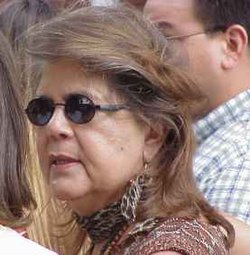Wilma Mankiller Quotes
About Author
Wilma Pearl Mankiller (Cherokee: ᎠᏥᎳᏍᎩ ᎠᏍᎦᏯᏗᎯ, romanized: Atsilasgi Asgayadihi; November 18, 1945 – April 6, 2010) was a Native American activist, social worker, community developer and the first woman elected to serve as Principal Chief of the Cherokee Nation. Born in Tahlequah, Oklahoma, she lived on her family's allotment in Adair County, Oklahoma, until the age of 11, when her family relocated to San Francisco as part of a federal government program to urbanize Indigenous Americans. After high school, she married a well-to-do Ecuadorian and raised two daughters. Inspired by the social and political movements of the 1960s, Mankiller became involved in the Occupation of Alcatraz and later participated in the land and compensation struggles with the Pit River Tribe. For five years in the early 1970s, she was employed as a social worker, focusing mainly on children's issues.
When Mankiller returned to Oklahoma in 1976, the Cherokee Nation hired her as an economic stimulus coordinator. With her expertise at preparing documentation, she became a successful grant writer, and by the early 1980s was directing the newly created Community Development Department of the Cherokee Nation. As Director she designed and supervised innovative community projects allowing rural citizens to identify their own challenges and, through their labor, participate in solving them. Her project in Bell, Oklahoma, was featured in the movie The Cherokee Word for Water, directed by Charlie Soap and Tim Kelly. In 2015, the movie was selected as the top American Indian film of the past 40 years by the American Indian Film Institute. Her project in Kenwood received the Department of Housing and Urban Development's Certificate of National Merit.
Her management ability came to the notice of the incumbent Principal Chief, Ross Swimmer, who invited her to run as his deputy in the 1983 tribal elections. When the duo won, she became the first elected woman to serve as Deputy Chief of the Cherokee Nation. She was elevated to Principal Chief when Swimmer took a position in the federal administration of the Bureau of Indian Affairs, serving until 1995. During her administration, the Cherokee government built new health clinics, created a mobile eye-care clinic, established ambulance services, and created early education, adult education and job training programs. She developed revenue streams, including factories, retail stores, restaurants and bingo operations, while establishing self-governance, allowing the tribe to manage its own finances.
Mankiller returned to her activist role as an advocate working to improve the image of Native Americans and combat the misappropriation of native heritage, by authoring books including a bestselling autobiography, Mankiller: A Chief and Her People, and giving numerous lectures on health care, tribal sovereignty, women's rights and cancer awareness after retiring from politics. Throughout her life, she had serious health problems, including polycystic kidney disease, myasthenia gravis, lymphoma and breast cancer, and needed two kidney transplants. She died in 2010 from pancreatic cancer, and was honored with many local, state and national awards, including the nation's highest civilian honor, the Presidential Medal of Freedom.
In 2021 it was announced that Mankiller's likeness would appear on the quarter-dollar coin as a part of the United States Mint's "American Women quarters" program.
When Mankiller returned to Oklahoma in 1976, the Cherokee Nation hired her as an economic stimulus coordinator. With her expertise at preparing documentation, she became a successful grant writer, and by the early 1980s was directing the newly created Community Development Department of the Cherokee Nation. As Director she designed and supervised innovative community projects allowing rural citizens to identify their own challenges and, through their labor, participate in solving them. Her project in Bell, Oklahoma, was featured in the movie The Cherokee Word for Water, directed by Charlie Soap and Tim Kelly. In 2015, the movie was selected as the top American Indian film of the past 40 years by the American Indian Film Institute. Her project in Kenwood received the Department of Housing and Urban Development's Certificate of National Merit.
Her management ability came to the notice of the incumbent Principal Chief, Ross Swimmer, who invited her to run as his deputy in the 1983 tribal elections. When the duo won, she became the first elected woman to serve as Deputy Chief of the Cherokee Nation. She was elevated to Principal Chief when Swimmer took a position in the federal administration of the Bureau of Indian Affairs, serving until 1995. During her administration, the Cherokee government built new health clinics, created a mobile eye-care clinic, established ambulance services, and created early education, adult education and job training programs. She developed revenue streams, including factories, retail stores, restaurants and bingo operations, while establishing self-governance, allowing the tribe to manage its own finances.
Mankiller returned to her activist role as an advocate working to improve the image of Native Americans and combat the misappropriation of native heritage, by authoring books including a bestselling autobiography, Mankiller: A Chief and Her People, and giving numerous lectures on health care, tribal sovereignty, women's rights and cancer awareness after retiring from politics. Throughout her life, she had serious health problems, including polycystic kidney disease, myasthenia gravis, lymphoma and breast cancer, and needed two kidney transplants. She died in 2010 from pancreatic cancer, and was honored with many local, state and national awards, including the nation's highest civilian honor, the Presidential Medal of Freedom.
In 2021 it was announced that Mankiller's likeness would appear on the quarter-dollar coin as a part of the United States Mint's "American Women quarters" program.
